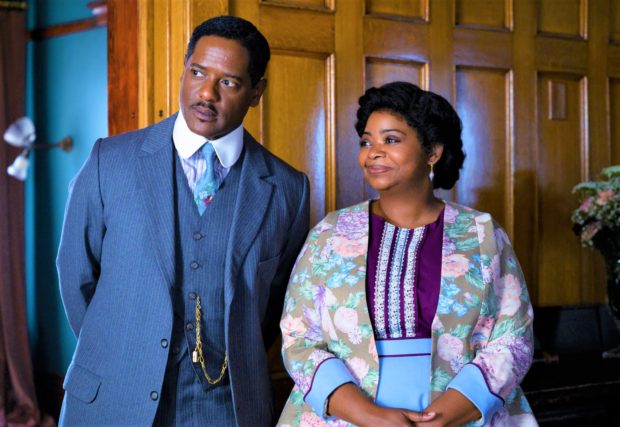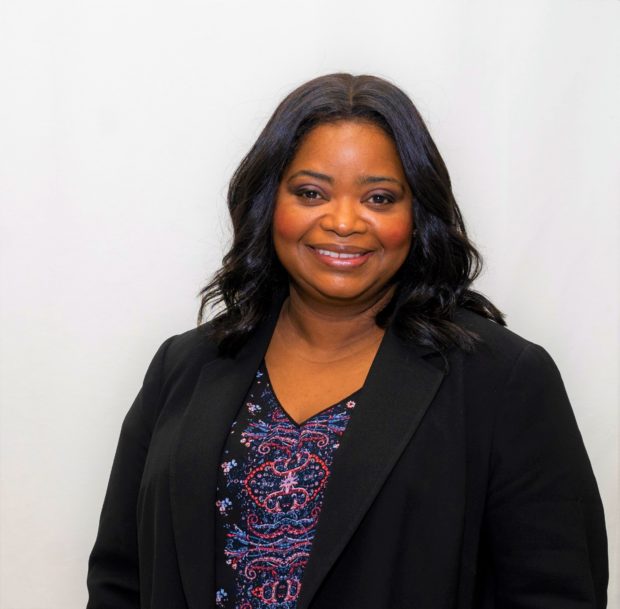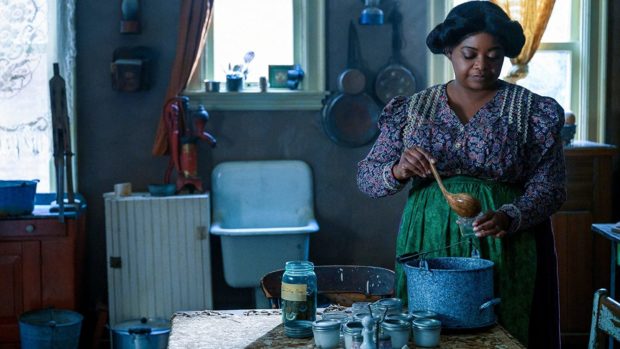Octavia Spencer talks about one surprise perk of collaborating with LeBron James
LOS ANGELES—With an impish grin, Octavia Spencer revealed one surprise perk of working with three-time NBA champion LeBron James.
LeBron and Maverick Carter, under their production company SpringHill Entertainment, produced the TV miniseries, “Self Made: Inspired by the Life of Madam CJ Walker,” which stars Octavia in the title role.
And that perk is not about LeBron and Maverick helping Octavia in her negotiations with Netflix, which is streaming the true-to-life saga of Madam CJ walker, the first female self-made millionaire in America.
The Oscar and Golden Globe best supporting actress winner for “The Help” relished portraying CJ, who made her fortune in the early 20th century by developing a line of cosmetics and hair care products for black women, which were rare in that era. The limited series, directed by DeMane Davis and Kasi Lemmons, was based on the biography, “On Her Own Ground,” by A’Lelia Bundles.
The Netflix series also stars Tiffany Haddish (Lelia), Carmen Ejogo (Addie), Blair Underwood (Charles James Walker) and Kevin Carroll (Ransom).

Octavia Spencer (right) and Blair Underwood star in “Self Made: Inspired by the Life of Madam CJ Walker.” —NETFLIX
Excerpts from our chat with Octavia:
How did LeBron James get involved as one of the executive producers of this miniseries?
The day it was announced that LeBron was doing this project with me, I was landing in LAX. My phone just started ringing messages. It was like 48. I was like, who died? I keep looking and it’s all of my straight male friends. They were all just checking in, like how are you doing, haven’t talked to you in a while.
It’s like, what’s going on here? Then I got a text, “I hear you’re doing something with LeBron.” That made it all clear. That’s LeBron’s impact on our society. I thank LeBron because I got a few dates out of that one (laughs)!
I’m a fan of LeBron on the court and I am a fan of the philanthropist he is off the court. The fact that LeBron understood Madam’s story—it was time for her story to be told—and wanted to be a part of telling that story, speaks volumes about who he is and what he, Maverick Carter and Jamal Henderson and everybody over at SpringHill want to do.
They became involved after I told Mark and Christine Holder that I needed some black voices in there. We got on like gangbusters. We all went out to pitch the project all over town. So, I feel very fortunate to have their involvement.
How familiar were you with the story of Madam CJ Walker?
I’ve got to tell you a funny story, and my agent is going to be really mad. For a few weeks, these producers of “Ozark” and a few other shows, Mark and Christine Holder, asked Brad Slater (Octavia’s agent) if I would want to play Madam CJ Walker. Brad saw that message on the call list, and they would play phone tag.
Then, I realized that Brad didn’t know who Madam was and thought she was the madam of a brothel (laughs), I’m assuming. So, he was like, “I’m not presenting her with the madam of a brothel role.” Finally he called me and said, “This has been on my phone sheet. Do you want to play Madam CJ Walker?”
I said, “Absolutely. When can we meet, because I have known her my whole life?” We weren’t in abject poverty growing up, but we were pretty poor. My mom told us there’s this woman, who before she even had the right to vote, was one of the first people in her family to be free as a slave, born free.
She was able to become the first self-made black female millionaire because all the other women who were wealthy inherited the money. And this woman was able to do that, when she wasn’t even seen as a citizen of the United States…So, Madam has always been right here. All of the societal upheaval that she had to endure to become who she was, that was inspirational to me.
How aware are you about the complex history of these products for African-American women?
I was very aware. My mom was a poor fashionista who liked to doll herself up. I was born in the ’70s, but I grew up in the ’80s and being interested in makeup. There were few foundations that fit my face or skin tone, so I had to buy a couple to blend them together. Now, we have made some progress.
I was definitely aware of what Madam meant to so many people at the time because there were no products for black women. None. And if you don’t feel beautiful, you don’t feel empowered.
The story of these two women who were both visionaries is compelling, but it’s ironic that they had this adversarial relationship. They could have helped each other. Can you talk about that?
Madam wanted that (to help each other). She went to Annie. In real life, it’s Annie Malone, but in the story, it’s Addie Monroe. Madam knew that Annie’s product worked, but it smelled bad.Madam wanted Annie to think outside the box in how she presented her product to the world and to black women. But Annie didn’t want to listen. So, Madam decided to create her own formula.
How do you handle it in real life when someone is an adversary?
I don’t really have adversaries because I am the type of person that lets you know in the beginning where we stand. Just make sure you’re treating me and the people we’re working with, with deference. If we are all doing that, then we’re going to be fine.
If you can’t, then there is a part of my personality that my friends call “Octane” (laughs). Octane just burns everything down in a minute, then I’m fine again, but you’re not (laughs).
Director Justin Simien came out with a film called “Bad Hair” and Chris Rock had a documentary titled “Good Hair.” Is this a trend?
Black hair is—if you don’t have it, you don’t understand it. White women with curly hair will understand what black women go through because once you get your hair styled, it doesn’t mean that it’s going to stay that way when you go out into the elements. Black hair has a different texture.
Madam CK was a self-made millionaire. When did you feel that you made it by yourself?
My dad died when I was 13, but he wasn’t really in my life. So, when my mom died when I was 17, it was a huge blow because it was unexpected for me and my siblings. When I graduated at Auburn University, that’s when I knew that I was self-made.
Can you talk about your coming film, Robert Zemeckis’ “The Witches” and your continuing collaboration with Guillermo del Toro, who is one of that movie’s producers?
I have loved Guillermo since his first movie. When I heard that he wanted to meet me for “The Shape of Water,” I was so humbled. I was like, he knows who I am? Oh my God! Our meeting was only supposed to take place for 30 minutes. It ended up being a three-hour, $10,000 meeting because right next door was an antique furniture place.
Guillermo likes antiques, and so do I. We had a meeting, then I went shopping because of Guillermo (laughs).
I’m excited about “The Witches.” I’ve always been a fan of Bob Zemeckis. I’ve never had to act opposite inanimate objects. The fact that I got to work with Bob on a project that Guillermo was also involved with—it was on my bucket list—my cup runneth over.
What is your favorite role behind the cameras?
People have always asked me, “What’s the role you feel you have been destined to play?” I have always said, producer, because that’s what I wanted to be first. Then, I realized I didn’t know what producers exactly did, but I knew that they brought people and projects together.
Does your plan include tapping more women directors?
I want to be able to tap different voices. I just worked with Silas Howard, and he’s transgender. I want to make sure that I’m working with directors, male or female, who wouldn’t normally get access to someone like me.
I’m not closing the door on any prospects. I’m definitely opening my door for good storytellers who need a shot because if my friend Tate Taylor hadn’t fought for me to be in “The Help,” I wouldn’t be sitting here in front of you. I would still be hoping to get that guest spot on whatever.
E-mail: rvnepales_5585@yahoo.com
Follow him at: twitter.com/nepalesruben

